- Home
- Martin Cruz Smith
Three Stations ar-7 Page 16
Three Stations ar-7 Read online
Page 16
"I don't think you've lost anything," Arkady said.
"The dacha is enormous. Sasha has two swimming pools, tennis courts and a ring for horses. Sometimes I think he pays people just to walk around."
"I'm sure it's very grand."
"You think I should go."
"You might be safer there than here."
"Do you have a dacha?"
"A shack." He tried to return to the attack. "As a journalist, do you keep an appointment book?"
"Is your shack on a river or a lake?"
"Just a pond."
"Describe it."
"Ordinary."
"In what way?"
"A cabin with three rooms, half of a kitchen, bad paintings, a stone fireplace, a family of hedgehogs under the porch, a canoe and a rowboat on a dock. My father was a general, but after enough vodka, he thought he was an admiral."
"That doesn't sound so bad. Was I dressed?"
"Excuse me?"
"When you found me, was I dressed?"
"Not completely."
"How did I look? Is blue in fashion?"
"You're asking the wrong man. What about Sasha Vaksberg? He must have called in reinforcements by now. He could have given you a hundred bodyguards."
"Maybe he would have. He's an unpredictable man."
Anya took in the high ceiling, a monstrous armoire, light patches on the wall where photographs and paintings had been removed.
"Did you grow up here? It must have been something at one time."
"It was where the 'party elite' lived, and it was a great honor to be assigned an apartment like this. On the other hand, it was full of false walls and secret passageways for the KGB to listen. And once a month or so, some famous face would disappear. So it was an honor with a certain risk. While no one could refuse to live in such a luxurious establishment, they always kept a suitcase packed."
"Did they ever listen in on your father?"
"He was very accommodating. He would tell the agents his itinerary for the day. And night."
"Did it affect you to live in such a haunted house?"
"I'm embarrassed to say no. I did find the wall that the agent sat behind. I had a rubber ball and I bounced it against the wall a hundred times, two hundred times."
"I don't think you were cut out to be a policeman."
"It's a little late in the day to learn that. What does it mean, 'God is shit'?"
She yawned. "I have no idea."
He said, "I understand 'God is dead.' 'God is shit' escapes me."
He waited but Anya had fallen into a deep, enviable sleep. Arkady got as comfortable as he could in the chair and dipped into the book he had taken from Madame Spiridona. The diary of a ballet dancer promised to be tame enough. After the triumph in Paris, we opened in Monte Carlo… That sort of thing.
Instead, the pages fell open to God is Dog, Dog is God, Dog is Shit, God is Shit, I am Shit, I am God.
And I am a beast and a predator… everyone will be afraid of me and commit me to a lunatic asylum. But I don't care. I am not afraid of anything. I want death.
26
Itsy had picked a trailer with a stove that, however small and miserly, kept her family warm. She swaddled the baby in her blue comforter and hardly gave her a chance to cry before a bottle was put to her mouth.
Itsy emphasized safety. Girls should beg in pairs. Boys might beg alone but in sight of each other. The problem was that the rain made any begging impossible; people lowered their eyes and bulled ahead. Although Itsy had a rule about not sniffing glue, it was difficult to enforce after hours of idleness. The silence was stranger for hearing through the wall the rush of passengers and the coming and going of trains. Sometimes a locomotive sounded as if it were coming right to their laps. The PA announced arrivals and departures in round, unintelligible tones.
Going to the children's shelter was out of the question. Not because the people who ran it were mean; most were kind. But the family would be split up according to age and sex and Tito would probably be shot.
Mainly to give the kids something to do, Itsy took them to the video arcade behind Leningrad Station, leaving the sleeping baby in the care of Emma, Tito and the two oldest boys, Leo and Peter. Itsy was barely out the door when the boys put Tito on a leash and took paper bags and cans of air freshener from their day packs. They dragged a mattress out of the trailer to sit on.
Emma piped up: "I know what you're doing."
"But you're not going to tell anyone, are you?" Leo said.
"Depends. Itsy won't be happy."
Peter said, "In case you haven't noticed, Itsy's not here. We're in charge."
"And we're bored," said Leo. "Everyone else has fun while we babysit you and the brat. Here." He offered her a cigarette.
"I can't. Because of the baby."
Peter smirked. "That's if you're pregnant. Jesus, you're stupid."
Emma, affronted, climbed into the trailer. If boys were so smart, how come they didn't know how to change a diaper? She considered the argument won.
Outside the trailer, Leo and Peter sprayed the freshener inside their paper bags, lifted the bags like cups of gold and breathed deeply. Almost instantaneously aerosol chemistry entered the bloodstream and breached the brain.
Euphoria and warmth flowed over the boys. Forgetting that he was in a railway repair shed, Leo remarked on the fading light. Fading but profound in a pre-Creation way. Because in that emptiness was, well, everything. The entire universe fit into the palm of his hand.
Peter said he was going to get his shit together. He had a plan to get off of the streets, study the martial arts, join the army, win some medals and become Putin's bodyguard. He would need his parents' consent to enlist early. That should be no problem; they would sign anything for a bottle of vodka.
A power sweeper rolled into the shed. The rider was a Tajik from the station chasing paper cups and soda cans. He not only had a headlight; he aimed a flashlight into the corners of the shed.
What the boys saw was a Mongol on a shaggy horse, a warrior of the Golden Horde in plate armor traveling from another time with arrows of blinding light. He maneuvered around the trench and approached the trailer and played the beam over Leo and Peter, over the bags and cans loose in their hands.
Tito the dog had been trained not to bark. He approached to the limit of his leash with his ears back and eyes burning while the warrior floated to the stack of fruit crates that Itsy's group had been breaking up to use as firewood. The pile was halfway down. He lifted a crate and examined a taut plastic sack of brown Afghan heroin. He removed and counted every sack, then replaced each sack and crate as it was.
When he was done he returned to the trailer. He lifted Peter by his forelock as if he were lifting a rat by the tail and slid open the blade of a box cutter. Peter's eyes rolled back. The Tajik's gaze only happened to follow and catch Emma at the window before she ducked down. Jostled, the baby began to cry.
Emma didn't need to think what to do next. It was as if a devil took over her body and she found herself functioning with cold selfishness, placing the baby as bait at one end of the trailer and crouching behind cots at the other. She was astonished and horrified at herself, but there was no stopping. While the Tajik entered the trailer and went to the baby, Emma slipped out the door and hid in the trench. The baby cried and cried. Emma closed her eyes, held her breath and clamped her legs together tight to keep from peeing.
The baby's crying abruptly stopped. Emma was sure she was next. Any second the devil would find her in the trench and slit her throat. Eventually she became aware that the sweeper was gone and Leo and Peter were drowsily comparing hallucinations.
"Tough. You missed out," Peter told Emma.
"It was wild," said Leo.
Emma said nothing. She rushed to the rear of the trailer. There the baby was sucking on a small, leather amulet like those worn by Tajik women passing through Three Stations. Inside the amulet would be a quotation from the Koran as protection for th
e bearer.
27
The cafe at Kazansky Station was becoming a regular haunt for Arkady and Victor. Arkady wondered how many times in a row Victor could escape paying the check.
"At this point you're not just challenging Zurin, you're taking on the apparatus of the state, and the state may have the brain of a sea slug but it reacts to threats and it protects itself. Certain people will come to your apartment and they won't be boys with stage fright and they will break some bones. And what do you do? You pick a fight with Zurin. By the way, when is your billionaire friend, Vaksberg, going to pick up his car? I got a call from the evidence clerk. It's pretty shot up."
"He'll probably just buy himself a new one. I'm not going to drive all the way to the highway to look at holes in a car. Is that your eau de cologne I smell?"
This was a twist; Victor used to drink eau de cologne.
"It's for men," Victor said.
"Some, maybe."
Victor lit a cigarette and played with a matchbox.
"May I?" Arkady took the matchbox away.
Although the box was yellow with age, a portrait of a young Anna Furtseva on the cover was unmistakable. All that was missing was the combustible wolfhound.
"You went back."
"She called and said she had found a photograph she wanted me to have. That's it in your hand. It was a joke, just a means of invitation. When I got there she had made borscht and put out smoked fish and bread and beer. Then she gave me a corduroy jacket barely worn. Some toiletries that were never used. It was like visiting Granny."
"A granny who wants you to shoot her downstairs neighbors. And the jacket fit?"
"Yes. She knew my size."
"It sounds that way." Arkady got in the car, turned on the engine and realized that he had no place to go. He was a former senior investigator. He could try to pursue the killer of Vera but he had no authority. The case would turn into the hobby of a harmless eccentric.
He had parked in the ranks of official cars in front of the station, one of the small perks that would be denied him in the future. He would also have to surrender his blue roof light and the right to use the official lane.
Brooding, it took him a minute to notice that Anya was arguing with a militia officer at the station's Oriental double door. On one side, a militia officer; on the other, a dozen kids in cloth caps and ragged sweaters, their wrists and necks ringed with dirt. They gathered around Anya like cats at a bowl of milk. The militia officer pushed them aside to get at the athletic bag. Arkady got out of the Lada as a tug-of-war over the bag developed. It was the sort of thing, he thought, that could end badly. Half of him wanted to walk away. Instead, he waded through the crush and whispered in an official tone, "Let her go or I will have your balls on a plate."
The officer automatically stepped back because people who spoke softly in such situations were used to giving orders.
Arkady followed up by asking Anya, "What's the problem?"
"I only asked to look in the bag," the officer said.
"He wants to steal my bag."
Arkady said, "I will open the bag."
Anya burned, but she handed over the bag. He unzipped it to display energy bars, medical kits, condoms, soap and woolen socks.
"Satisfied?" Anya asked.
"You're going to sell these," the officer said.
"No, it's for children, homeless children. The Vaksberg Foundation gives them clothes, blankets, bedrolls. It's hardly going to improve the welfare of homeless children, but it shows them that somebody cares."
"To give away."
"Yes, to give away."
The officer went off disappointed, already searching for fresh prey.
Arkady pulled Anya into the station.
"What are you doing out of bed?"
"You think I should lie there all day long?"
"Yes," said Arkady. "Bed rest is the standard treatment for almost getting killed. Why are you acting this way? What happened?"
Street children filtered back in and she tried to say nothing, but the words came out: "Vaksberg has been skimming."
"You just found this out?"
"This morning. He's bankrupt."
"But he's a billionaire."
"Billionaires go bankrupt all the time. This morning I was trying to write. I read a Vaksberg Group memo I was never supposed to see. That's the danger of giving a writer total access. It was from Sasha to the chief financial officer instructing him how to inflate the valuation of the company as if all his casinos were operating. He's bankrupt."
"Then how did he fund the luxury fair?"
"There's only one way. He paid out what he took in. He's been skimming for months."
"What are you going to do?"
"Nothing. Nobody would give to any children's fund again. They want a reason not to."
"What can I do?"
"Oh, yes. You can advise ten-year-old girls how to put a condom on a grown man's dick." Louder she said, "Everyone wave to Uncle Arkasha because he's going away." At first Arkady simply drove to escape Anya's scorn. Then he drove aimlessly because he didn't want to be anywhere.
Except the dacha.
The dacha passed to him from his father was no more than two hours from the city. It was a ramshackle cabin overgrown with lilacs and brambles but it had springwater and a path through a stand of black pines to a lake not much larger than a pond. An elderly neighbor looked in from time to time to check the house for leaks or hornet nests. Boris had to be almost ninety now. Whenever he discovered that Arkady had arrived, he would show up at the door as busy as a badger in a long scarf carrying a tray of pickles and bread and a jar of samogon. Moonshine. Arkady always invited him in for a glass. Eyes shining, Boris would pour samogon until it quivered with surface tension above the brim of the glass.
"Such a small glass," he said every time. Later they would walk to the church and visit his wife's grave. The cemetery was a maze of white crosses and black wrought iron fences, some grave sites so "landlocked" that they were beyond reach.
Boris would set a jar of pansies or daisies at his wife's cross. He changed the flowers every day in summer. There was a bench at the grave site so a person could really visit. Nothing had to be said aloud. In the winter Arkady thought of it as ice fishing with God. There were times, however, when he felt one with the world, when his breath was a cloud and the birches brushed one against the other like a line of dancers curtsying in turn.
Instead, he drove to a towed-vehicle yard on the Ring Road, where there were no trees, only lamps and rain and a system designed to create the greatest possible inconvenience for anyone retrieving a towed car. The master of the yard negotiated fines and bribes at the window of a caravan while car owners stood in the rain. Cars held as evidence in criminal cases were in a separate, abutting lot that was as still as a graveyard because there was no ransom to be made from cars going nowhere.
The guard recognized Arkady and waved him through. "Remember, anything you find has to be reported to me."
"Absolutely."
"She's all yours," the guard said, and trotted back to his post.
Sasha Vaksberg's Mercedes seemed to be sinking into the mire like an abandoned warhorse. Arkady counted five holes in the right rear fender and door. Otherwise, the car was practically new and likely to disappear if Vaksberg didn't claim it. A billionaire could just buy a new Mercedes like disposable tissue; use it once and throw it away.
There was nothing in the car's cabin, although Arkady went through the glove compartment, side and seat pockets, under the floor pads.
He opened the trunk. In the spare-tire well was his small reward, a ticket printed on paper so cheap it almost disintegrated in his hand. It was torn on the diagonal and said Central Mosc-ticket #15-100 ru- Ticket to what? A movie? The symphony? The circus? Belonging to Dopey or Vaksberg or his dead driver or bodyguard? Or the last person to change a tire? Arkady had no idea. The tease was worse than finding nothing. This was what he had come down to, a wet stu
b.
It began to rain heavily. Arkady waved as he passed through the gate. The guard waved back, thankful that he had not been beckoned from his miserable shelter.
Rain fell in sheets. Where water pooled, trucks pounded through and cars rooster-tailed. At the height of the downpour, the wiper came half off on Arkady's side of the windshield. Somehow the clip that attached the rubber blade to the wiper itself had come off. He turned off to the side of the road to reconnect it. What next? Arkady wondered. Snow? Frogs? Snow and frogs? He had only himself to blame. Once Victor mentioned the Mercedes, Arkady was compelled to examine it.
It wasn't a totally empty road. The blurred lights of an industrial park lurked a few kilometers ahead. There was plenty of room on the shoulder and Arkady worked by the light of the Lada's open door. The wiper clip was bent. The trick was to bend it back without snapping it off. He remembered the days when rain would cause general confusion as cars pulled off to put on their precious windshield wipers. In those days, a driver carried a whole toolbox.
Arkady needed a pair of needle-nose pliers he did not have. He felt that no one should attempt to drive Victor's Lada unless he was completely outfitted. Say a needle-nose pliers and an inflatable raft. That was what made life an adventure. He worked by the light of the open door and squinted at the oncoming high beams of a truck that straddled the shoulder of the road. He shielded his eyes. Someone's idea of a joke, Arkady told himself. He felt his whole body light up. Beyond shielding his eyes, he couldn't move. They would turn any second. Any second.
Arkady dove into the Lada. With a crack the door of the Lada went sailing. By the time he pulled himself up, all Arkady saw were taillights dissolving in the dark.
28
"Have you ever tried to carry a car door in the rain?" Arkady asked.
Victor said nothing, only circled his car in disbelief. It was parked outside in the morning sun at the upscale Patriarch's Pond militia station, virtually a "No Lada Zone."

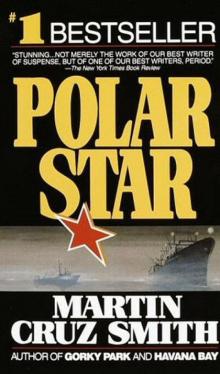 Polar Star
Polar Star Red Square
Red Square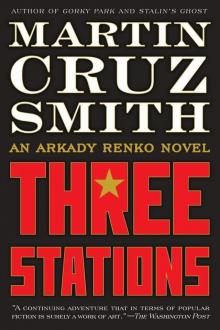 Three Stations
Three Stations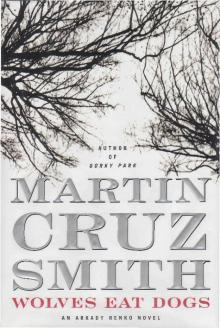 Wolves Eat Dogs
Wolves Eat Dogs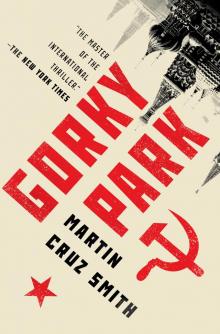 Gorky Park
Gorky Park December 6
December 6 Havana Bay
Havana Bay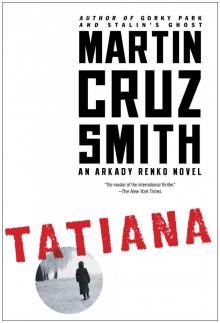 Tatiana
Tatiana The Girl From Venice
The Girl From Venice Stalin's Ghost
Stalin's Ghost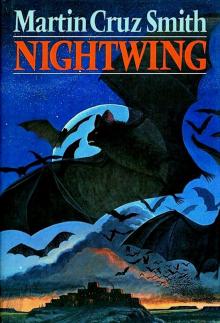 Nightwing
Nightwing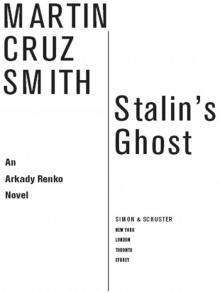 Stalin s Ghost
Stalin s Ghost Gypsy in Amber
Gypsy in Amber Rose
Rose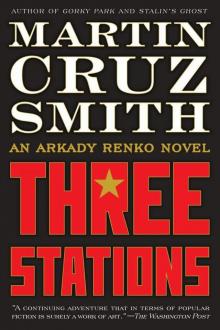 Three Stations: An Arkady Renko Novel
Three Stations: An Arkady Renko Novel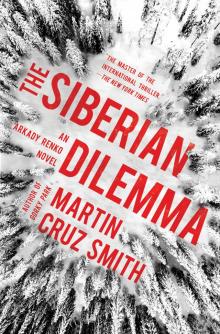 The Siberian Dilemma
The Siberian Dilemma December 6 (V5.0)
December 6 (V5.0)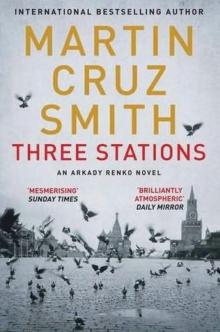 Three Stations ar-7
Three Stations ar-7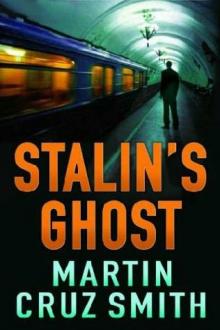 Stalin’s Ghost ar-6
Stalin’s Ghost ar-6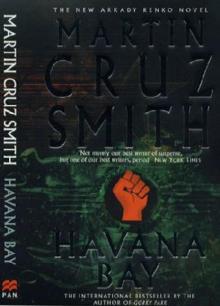 Havana Bay ar-4
Havana Bay ar-4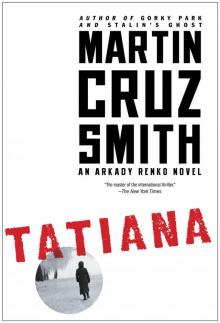 Tatiana ar-8
Tatiana ar-8